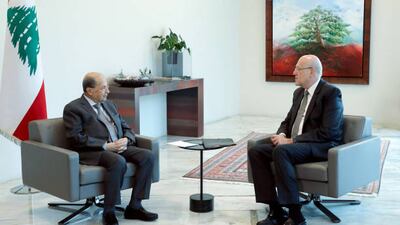Lebanon’s prime minister-designate Najib Mikati met the president for the second consecutive day and for the sixth time since his designation, but signalled no progress in negotiations over the government’s make-up despite a worsening economic crisis and rising tensions with Israel.
“Silence speaks louder than words,” Mr Mikati said on Friday after his meeting with President Michel Aoun.
The billionaire businessman is the third prime minister to attempt to form a Cabinet in less than a year.
“I didn’t want to speak today with regards to the government … what matters is the outcome, God willing,” he said.. His statement came hours after Iran-backed Hezbollah launched a rocket attack on Israel in response to the first air strikes to hit Lebanon since the 2006 war. The Israeli air strikes were in retaliation for several unclaimed rocket attacks that hit Israel from Lebanon in recent weeks.
Mr Mikati said he discussed the security developments with the president.
The prime minister-designate has been negotiating with Mr Aoun over the allocation of several portfolios among the country’s major parties and whether to maintain the same arrangement adopted in Hassan’s Diab caretaker government.
Mr Mikati indicated that an agreement has yet to be reached over each party’s share in the Cabinet.
A source close to the president said negotiations were still focused on the allocation of key portfolios, including the finance, interior and justice ministries.
Mr Mikati said he will be co-ordinating with the president to schedule another meeting to pursue discussions.
The source said the meeting is likely to take place after the Hijri New Year.
Mr Mikati was appointed after former prime minister-designate Saad Hariri, the country’s top Sunni politician, failed to reach an agreement with the president over the government’s make-up after nine months of bickering.
Mr Hariri, who accused the president of blocking the formation of a government where he lacks veto power, has backed Mr Mikati for the post on condition that he upholds the same principles in negotiations.
Mr Aoun had accused Mr Hariri of seeking to dictate the line-up, in breach of the constitution. The Future Movement leader had argued that the president was blocking the formation of a Cabinet of non-partisan experts in line with a French initiative.
The international community, led by the US and France, has been urging Lebanon to quickly form a Cabinet that enacts reforms in exchange for financial support.
But its calls have fallen on deaf ears, prompting the EU to threaten Lebanese officials with sanctions for blocking reforms.
Lebanon has been without a functioning government since the Beirut blast that toppled Mr Diab’s government after killing more than 214 people and injuring thousands over a year ago.
The blast, one of the world’s most powerful non-nuclear explosions, destroyed thousands of properties in the capital and compounded the country’s financial woes.
Since the crisis unfolded in late 2019, the national currency has lost more than 90 per cent of its value, plunging more than half the population into poverty.
An aid conference organised by the UN and France on the anniversary of the blast pledged $370 million in humanitarian aid that will be channelled to Lebanon’s most vulnerable communities.
French President Emanuel Macron told the conference “there won’t be any blank cheques” for Lebanon’s political elite.


